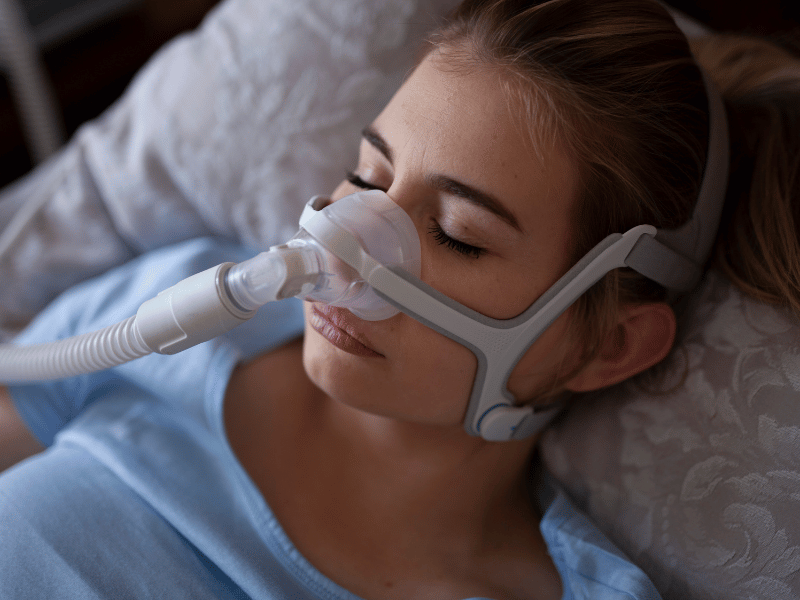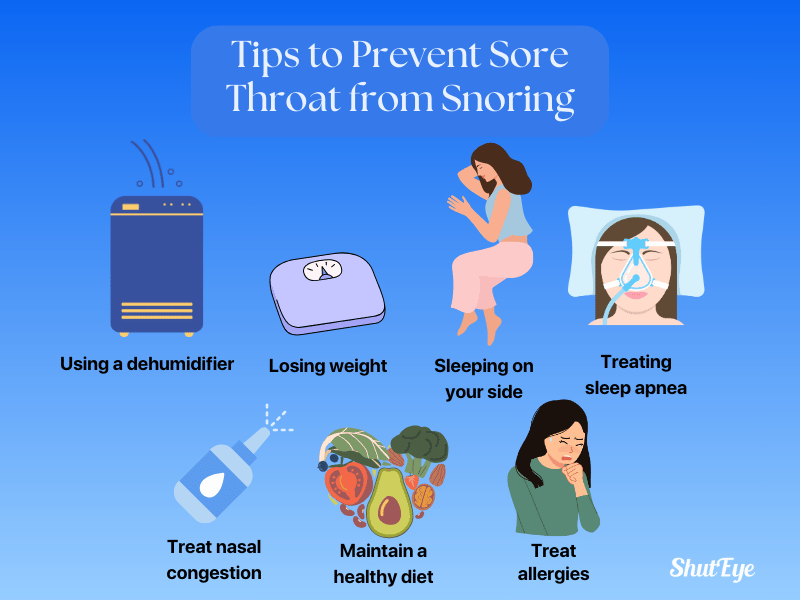


Do you often wake up in the morning, feeling discomfort and soreness in your throat? Wonder if you could have gotten a sore throat from snoring? In this article, we’ll explore why you may get a sore throat from snoring at night, some common causes, and tips to prevent that from happening.

Snoring occurs when the throat tissues vibrate— a result of the throat muscles relaxing during sleep [1]. It can be loud or soft depending on the severity. It’s estimated that around 45% of adults snore occasionally, while 25% of adults snore regularly— often disrupting their bed partner’s sleep [2].
Snoring can cause daytime sleepiness, problems with concentration, and increased risk of high blood pressure, heart conditions or stroke. Loud snoring is typically a sign of a serious sleep disorder, obstructive sleep apnea (OSA).
See also: How To Sleep With Someone Who Snores?

When you snore, it causes your throat tissues to vibrate. This constant vibration leads to irritation and inflammation of your throat tissues, which results in throat pain and soreness.
Additionally, snorers commonly experience mouth breathing which may further exacerbate the discomfort and lead to a dry or sore throat.
It’s important to note that snoring can cause damage to the throat muscles, especially if it’s moderate to severe snoring. It can lead to neuromuscular injury or structural damage, making it more difficult for the body less efficient at recovery [3].
The feeling and intensity of sore throats often depend on their cause. Some common symptoms that people have reported feeling include dry and scratchy throat, pain when swallowing, cough, runny nose, conjunctivitis, or changes in the way your voice sounds [4].
While the virus is said to be the most common cause of sore throat, there are other reasons why you may experience sore throat at night. These possible reasons include:

Our bodies naturally produce saliva for our throats to function properly. When we do not consume enough water, it can affect our body’s ability to produce the saliva that we need. As a result, it causes dry mouth and inflammation of throat tissues, which ultimately leads to a sore throat [5].

Snoring is closely connected with mouth breathing, which can cause irritation to your throat and lead to sore throat. Loud, chronic snoring is also associated with obstructive sleep apnea (OSA), a sleep disorder in which your breathing pauses several times during the night [6].
It’s estimated that around 1 billion people around the world are affected by sleep apnea [7].

Allergies can also sometimes be the reason for a sore throat. When you are exposed to an allergic trigger, your body produces histamines as a natural response. It is how your body tries to protect itself.
These histamines cause your body to increase the production of mucus, often leading to excess mucus in the throat, also known as post-nasal drip. As a result, you will find that your throat may feel uncomfortable or scratchy [8].
Viral infections such as the flu and common cold can cause sore throat or pharyngitis to occur. Viral pharyngitis may take approximately 5 to 7 days to recover on its own. Some solutions to relieve it include salt water gargles, painkillers, and drinking more water [9], [10].
Strep throat is a common form of bacterial infection that causes fever and your throat to swell. It is caused by the bacteria, streptococcus pyogenes and is typically contagious, commonly affecting children. If diagnosed with strep throat, you can expect your doctor to prescribe you a round of antibiotics treatment to ease symptoms [11].
It’s also important to note that if you have a viral or bacterial infection that is accompanied by a high fever, you should consult with a doctor as soon as possible for proper treatment.

To prevent yourself from snoring and getting sore throat at night due to it, you may want to consider options such as:
By incorporating these remedies and treatment options into your routine, hopefully, you’ll be able to find a reduction in snoring symptoms and thus, improve your sleep quality.
In conclusion, you can develop a sore throat as a result of snoring. This is mainly due to the vibration of throat tissues and mouth breathing, which leads to inflammation and irritation of the throat muscles. Knowing the cause of your sore throat, implementing lifestyle changes, or seeking professional help from a doctor can help you to alleviate sore throat symptoms and minimize snoring.
Additionally, ShutEye® app can help you to determine if your sore throat occurs as a result of snoring. One of the key features of ShutEye besides being a sleep tracker is that it also functions as a sleep sound recorder, easily detecting snores or sleep talk at night. Try it for free!
American Family Care (2025) Can Dehydration Cause a Sore Throat? [online]. Available at: https://www.afcurgentcare.com/grand-junction/blog/can-dehydration-cause-a-sore-throat/
Benjafield, A. V., Ayas, N. T., Eastwood, P. R., Heinzer, R., M Ip, M. S., Morrell, M. J., Nunez, C. M., Patel, S. R., Penzel, T., Pépin, L. D., Peppard, P. E., Sinha, S., Tufik, S., Valentine, K., & Malhotra, A. (2019). Estimation of the global prevalence and burden of obstructive sleep apnoea: A literature-based analysis. The Lancet. Respiratory Medicine, 7(8), 687. Available at: https://doi.org/10.1016/S2213-2600(19)30198-5
Centre for Disease Prevention (2024) Sore Throat Basics [online]. Available at: https://www.cdc.gov/sore-throat/about/index.html
Davis, C. (2023) Is Sore Throat (Pharyngitis) Contagious? [online]. Available at: https://www.medicinenet.com/is_sore_throat_pharyngitis_contagious/article.htm
Felson, S. (2023) Waking Up With Sore Throat: What to Know [online]. Available at: https://www.webmd.com/sleep-disorders/sleep-apnea/waking-with-sore-throat
John Hopkins Medicine (2025) Why Do People Snore? Answers for Better Health [online]. Available at: https://www.hopkinsmedicine.org/health/wellness-and-prevention/why-do-people-snore-answers-for-better-health
John Hopkins Medicine (2025) Strep Throat [online]. Available at: https://www.hopkinsmedicine.org/health/conditions-and-diseases/strep-throat
John Hopkins Medicine (2025) Pharyngitis [online]. Available at: https://www.hopkinsmedicine.org/health/conditions-and-diseases/pharyngitis
SnoreMD (2025) Can Snoring Damage Your Throat? [online]. Available at: https://snoremd.com.au/can-snoring-damage-your-throat/
Stuck, B. A., & Hofauer, B. (2019). The Diagnosis and Treatment of Snoring in Adults. Deutsches ÄRzteblatt International, 116(48), 817. Available at: https://doi.org/10.3238/arztebl.2019.0817
Zyrtec (2025) Can Allergies Cause A Sore Throat? [online]. Available at: https://www.zyrtec.com/allergy-guide/understanding-allergies/symptoms/sore-throat